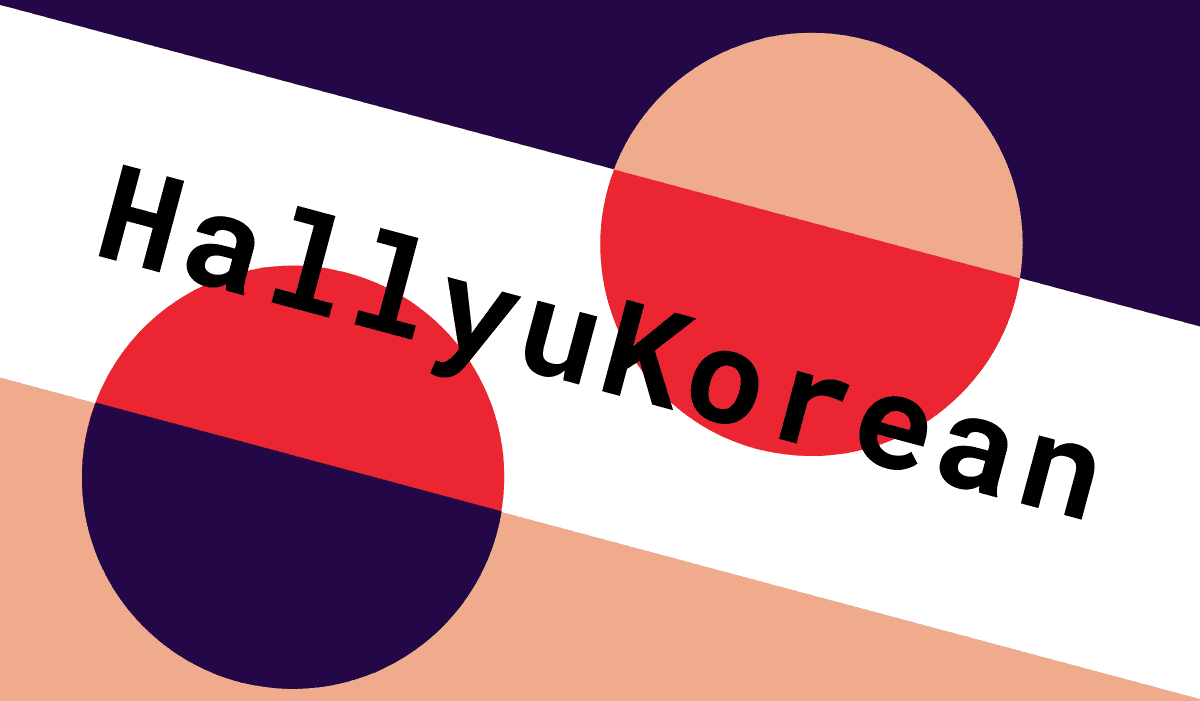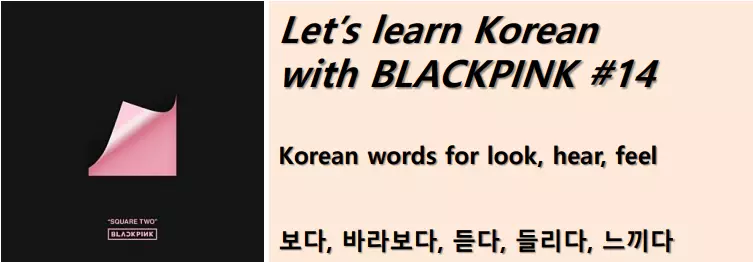Korean words for look, hear, feel : 보다, 바라보다, 듣다, 들리다, 느끼다
Let’s learn Korean words for look, hear, feel with BLACKPINK lyrics.
Click the play button below to listen to all the BLACKPINK lyrics used in this post.
보다 [bo-da] to see, to look
뒤는 절대 안 봐
dwi-neun jeol-dae an bwa
I never look back
*뒤(behind) + 는(topic particle) +
절대(never) +
안(not) +
봐(look)
바라보다 [ba-ra-bo-da] to look (at), to watch
넌 나만 바라봐
neon na-man ba-ra-bwa
Just look at me
*넌(너(you) + 는(topic particle), =넌) +
나(I) + 만(only) +
바라봐(look at)
듣다 [deut-tta] to hear, to listen
네가 말로만 듣던 걔가 나야 Jennie
ne-ga mal-lo-man deu-tteon gyae-ga na-ya Jennie
The girl you’ve been hearing about, that’s me, Jennie
*네가(너(you) + 가(subject particle), =네가) +
말(word) + 로(by) + 만(only)
듣던(듣다(hear) + ~던(noun modifier)) +
걔(he/she) + 가(subject particle) +
나야(나(I) + 이다(be), =나야)
Jennie
(*~(으)로 is used to indicate direction, method, cause, and status, and it can be translated ‘with’, ‘by’, ‘as’, ‘for’, or ‘to’.
Verb stem + ~던 is used to recall a past action or habit that has been repeated often or is still present.
Verb stem + ~았/었던 is used to recall a past event that has not continued into the present.
얘, 걔, 쟤 refer to he/she, this/that person.
The literal interpretation is that it’s a contraction of 이 아이(this child), 그 아이(that child), 저 아이(that child) and a very informal expression.
When the verb ~이다 is conjugated with ~이야/야, 이야 for noun which end with a consonant, 야 for noun which end with a vowel.)
들리다 [deul-li-da] to be heard
들리지 않아 what you say
deul-li-ji a-na what you say
I can’t hear what you say
*들리지 않아(들리다(to be heard) + 지 않다(can’t))
(*들리다 is the passive voice of 듣다. And 들리다 is used to say that someone can hear something.
This sentence has no subject.
It’s important to note that while English sentences require a subject, Korean sentences often omit the subject.
The omitted subject can be identified in the context of the dialogue or writing.)
느끼다 [neu-kki-da] to feel
느낌 [neu-kkim] feeling
처음 만나는 거였는데 이미 한 네 번은 만난 느낌이었어요
cheo-eum man-na-neun geo-yeot-neun-de i-mi han ne beo-neun man-nan neu-kki-mi-eot-seo-yo
It was the first time we met, but it felt like we’d already met four times
*처음(first time) +
만나는(만나다(meet) + 는(noun modifier)) +
거였는데(거(thing) + 였다(was) + ~는데, =거였는데) +
한(about) +
네(four) +
번(time) + 은(topic particle) +
만난(만나다(meet) + ㄴ(noun modifier)) +
느낌이었어요(느낌(feeling) + 이다(be) + 었다(past tense))
(*Verb stem + ~었는데/았는데/였는데 is used to give a more detailed explanation of the action in the preceding clause that happened in the past.)
한 usually means ‘one’, but it can also mean ‘about, nearly’.
To make a verb past tense, you must first remove 다 from the infinitive form of the verb, which gives you the verb stem. Then you must add the correct past tense ending to the verb to make it past tense.
If the last vowel in a verb stem is ㅏ or ㅗ, add 았다 or 았어 or 았어요.
If the last vowel in a verb stem is NOT ㅏ or ㅗ, add 었다 or 었어 or 었어요.
Also, if a verb ends in 하다, change the 하다 to 했다 or 했어 or 했어요 to make it past tense.
Grammar Reference
*Tense
*Present tense : Adjective/verb stem + ~아/어/해요
*Past tense : Adjective/verb stem + ~았/었/했어요
*Future tense : Adjective/verb stem + ~(으)ㄹ 거예요 / ~ㄹ 게요/ ~겠어요
The basic way to get the verb/adjective stem is to remove 다 from the verb/adjective.
If there is a vowel ㅏ or ㅗ on the final syllable of the adjective/verb stem, 아요(present tense), 았어요(past tense), 을 거예요(future tense) is used.
If there is a vowel other than ㅏ or ㅗ on the final syllable of the adjective/verb, 어요(present tense), 었어요(past tense), ㄹ 거예요(future tense) is used.
Also, if there is 하다 in the adjective/verb, 하다 changes to 해요(present tense), 했어요(past tense), 할 거예요(future tense).
Below you can see the conjugation of 보다, 바라보다, 듣다, 들리다, 느끼다 by tenses.
| Present tense | Past tense | Future tense | |
| 보다 | 보아요 | 보았어요(=봤어요) | 볼 거예요 |
| 바라보다 | 바라보아요 | 바라보았어요(=바라봤어요) | 바라볼 거예요 |
| 듣다 | 들어요 | 들었어요 | 들을 거예요 |
| 들리다 | 들려요 | 들렸어요 | 들릴 거예요 |
| 느끼다 | 느껴요 | 느꼈어요 | 느낄 거예요 |
*Speech levels
The three most commonly used Korean speech levels are 합쇼체 (formal polite), 해요체 (informal polite) and 해체 (informal plain).
*The formal polite style : Adjective/verb stem + ~(스)ㅂ니다
~(스)ㅂ니다 is used more in formal or public situations including the military, news, reporting presentations, meetings and lectures. It’s mainly used to address large gatherings or people you don’t know personally.
*The informal polite style : Adjective/verb stem + ~아/어/해요
~아/어/해요 is most commonly used in everyday life. Compared to the formal polite style, the informal polite style is softer and less formal, so it is mainly used among family members, friends, shopkeepers and other close acquaintances.
*The informal plain style : Adjective/verb stem + ~아/어/해
As for the informal plain style ~아/어/해, it is mainly used among friends from superiors to people of lower rank and among family members.
Below you can see the conjugation of 보다, 바라보다, 듣다, 들리다, 느끼다 by speech levels.
| Formal polite | Informal polite | Informal plain | |
| 보다 | 봅니다 | 보아요 | 봐 |
| 바라보다 | 바라봅니다 | 바라보아요 | 바라봐 |
| 듣다 | 듣습니다 | 들어요 | 들어 |
| 들리다 | 들립니다 | 들려요 | 들려 |
| 느끼다 | 느낍니다 | 느껴요 | 느껴 |

